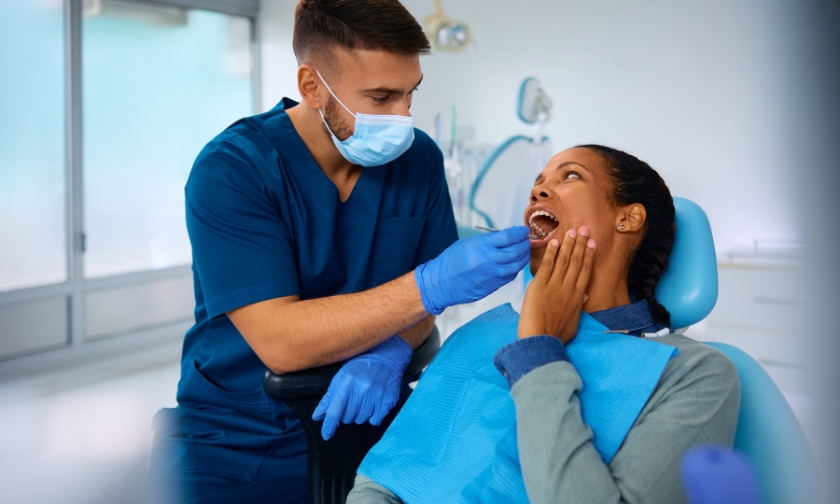
A swollen face. An incessant throbbing ache. A bad taste in the mouth that won’t subside. These aren’t just signs of a toothache—they could be signs of a dental abscess. For most people in Newton, this is a dental emergency sooner or later. If left untreated, an abscess can lead to severe infection in your jaw, sinuses, or bloodstream. Knowing when to seek emergency dental care is crucial. Let’s review what a dental abscess is, how to recognize symptoms, and how Newton Dental Studio helps local patients receive prompt pain relief.
What Is a Dental Abscess?
An abscessed tooth or a dental abscess is also known as a collection of pus caused by an infection inside the mouth. A disease that occurs in a tooth or the gums around the root of a tooth is also called an abscess, and it usually manifests itself as pain, inflammation, swelling, and sensitivity. A dental abscess is not just a painful inconvenience—it’s a serious oral health condition that requires prompt attention from a dental professional. If left untreated, it can lead to severe complications, including the spread of infection to other areas of the face, jaw, or even the bloodstream.
What Causes a Dental Abscess?
Dental abscesses usually develop when harmful bacteria enter the inner layers of the tooth or gum tissue—often through:
- Untreated cavities that allow decay to progress deep into the tooth
- Cracked or chipped teeth that expose the inner pulp
- Severe gum disease (periodontitis) that damages the soft tissue and bone
- Injury or trauma to the mouth
- Poor oral hygiene increases the risk of plaque buildup and bacterial growth
Once bacteria invade the soft inner tissue (pulp) or gum pockets, the body sends white blood cells to fight the infection, forming pus.
Know the Symptoms Before It Gets Worse
While not every toothache signals a dental emergency, specific symptoms should never be ignored—especially when they may indicate a dental abscess. The earlier you recognize the warning signs, the better your chances of preventing serious complications. A dental abscess is a rapidly progressing infection, and delaying treatment can lead to damage to the surrounding bone, loss of the tooth, or the spread of disease to other parts of the body.
You may be dealing with a dental abscess if you experience any of the following symptoms:
- Severe, throbbing tooth pain that may radiate to the jaw, ear, or neck
- Swelling in the jaw, face, or cheek that can develop suddenly or worsen over time
- A visible boil or bump on the gum that may ooze pus
- Sensitivity to hot or cold temperatures—especially when the sensation lingers
- Fever, fatigue, or general feeling of illness (signs that the infection is spreading)
- A persistent bad taste or foul odor in the mouth, often caused by draining pus
- Pain when chewing or biting down
If left unattended, these symptoms can rapidly accelerate and perhaps reach a critical point. Oral health is directly related to general health; knowing the signs early on and moving fast can save both.
Why Quick Action Matters When You Deal With an Abscess
Dental abscesses don’t heal on their own. Severe infections like this can spread to your jaw, neck, or even bloodstream—a condition called sepsis. This is especially concerning for people with underlying health conditions. That’s why timely treatment is necessary.
Your dentist may drain the abscess, prescribe antibiotics, or recommend root canal therapy. In other cases, the infected tooth needs to be extracted to prevent the infection from spreading.
A tooth abscess is painful, and the infection can spread to other areas of your body if not treated. Temporary remedies at home can help relieve some symptoms, though they are not a replacement for medical care. If you get yourself treated early, there is a greater chance that the affected tooth can be saved and will not result in further complications. Do not wait if you are showing symptoms of a dental abscess. Reach out to an emergency dentist near you for prompt and effective care. Your health—and your smile—depend on it.



